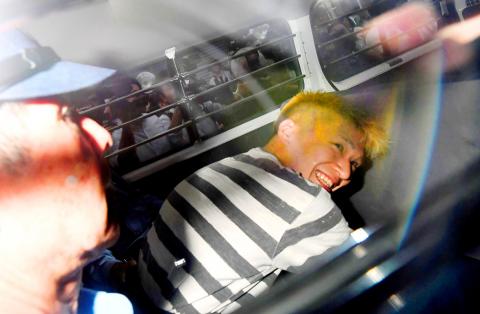A Japanese man was yesterday sentenced to death for the stabbing murder of 19 disabled people at a care home, in one of the nation’s worst mass killings.
Satoshi Uematsu never disputed his involvement in the grisly rampage, but his lawyers entered a plea of not guilty, saying the 30-year-old was suffering a “mental disorder” linked to his use of marijuana.
The Yokohama District Court ruled that the former employee of the facility deserved no leniency over the 2016 attack, which shocked the nation.

Photo: Reuters / Kyodo
“The lives of 19 people were taken away. This is profoundly grave,” chief judge Kiyoshi Aonuma told the court.
Uematsu planned the murders and had “an extreme intention to kill,” he added.
Prosecutors had sought the death penalty — which in Japan is carried out by hanging — and said the defendant was capable of taking responsibility for the violence at the Tsukui Yamayuri-en center in Sagamihara, a city just outside Tokyo.
Uematsu was impassive as the verdict was announced, looking straight ahead at the judge as he was sentenced.
He wore a black suit with his hair in a long ponytail down to his waist, and was flanked by six uniformed court officers wearing masks.
Uematsu, who faced six charges, including murder, reportedly said before the trial that he would not appeal any verdict, though he argued he did not deserve the death penalty.
He has reportedly said he wanted to eradicate all disabled people in the horrifying attack that also left 26 people wounded.
He turned himself in to police after the assault, carrying bloodied knives.
It later emerged he had left his job at the home just months earlier and been forcibly hospitalized after telling colleagues he intended to kill people at the center.
However, he was discharged after just 12 days when a doctor decided he was not a threat.
He had also written a letter outlining plans to attack the home, claiming “disabled people only create unhappiness.”
Among the few victims to be identified publicly was a 19-year-old woman, Miho, whose mother said Uematsu “didn’t need a future.”
“I hate you so much. I want to rip you apart. Even the most extreme penalty is light for you. I will never forgive you,” the mother said before the verdict, public broadcaster NHK said. “Please bring back my most precious daughter... You’re still alive. It’s not fair. It’s wrong.”
“I demand capital punishment,” she added.
Takashi Ono, whose son was severely injured in the attack, told reporters he was “relieved.”
“The judge gave the sentence the victims’ families hoped for,” he said.
However, some questioned the need for the death sentence, a policy that faces little major opposition in Japan.
“It shouldn’t have been the death sentence. We should have allowed him to learn better,” said Rie Sumida, a disabled 45-year-old woman waiting for the verdict.
“If you kill the person because of what he did, it means you do the same thing as Uematsu,” she said.

NATIONAL SECURITY THREAT: An official said that Guan Guan’s comments had gone beyond the threshold of free speech, as she advocated for the destruction of the ROC China-born media influencer Guan Guan’s (關關) residency permit has been revoked for repeatedly posting pro-China content that threatens national security, the National Immigration Agency said yesterday. Guan Guan has said many controversial things in her videos posted to Douyin (抖音), including “the red flag will soon be painted all over Taiwan” and “Taiwan is an inseparable part of China,” while expressing hope for expedited “reunification.” The agency received multiple reports alleging that Guan Guan had advocated for armed reunification last year. After investigating, the agency last month issued a notice requiring her to appear and account for her actions. Guan Guan appeared as required,

Japan and the Philippines yesterday signed a defense pact that would allow the tax-free provision of ammunition, fuel, food and other necessities when their forces stage joint training to boost deterrence against China’s growing aggression in the region and to bolster their preparation for natural disasters. Japan has faced increasing political, trade and security tensions with China, which was angered by Japanese Prime Minister Sanae Takaichi’s remark that a Chinese attack on Taiwan would be a survival-threatening situation for Japan, triggering a military response. Japan and the Philippines have also had separate territorial conflicts with Beijing in the East and South China

A strong cold air mass is expected to arrive tonight, bringing a change in weather and a drop in temperature, the Central Weather Administration (CWA) said. The coldest time would be early on Thursday morning, with temperatures in some areas dipping as low as 8°C, it said. Daytime highs yesterday were 22°C to 24°C in northern and eastern Taiwan, and about 25°C to 28°C in the central and southern regions, it said. However, nighttime lows would dip to about 15°C to 16°C in central and northern Taiwan as well as the northeast, and 17°C to 19°C elsewhere, it said. Tropical Storm Nokaen, currently

PAPERS, PLEASE: The gang exploited the high value of the passports, selling them at inflated prices to Chinese buyers, who would treat them as ‘invisibility cloaks’ The Yilan District Court has handed four members of a syndicate prison terms ranging from one year and two months to two years and two months for their involvement in a scheme to purchase Taiwanese passports and resell them abroad at a massive markup. A Chinese human smuggling syndicate purchased Taiwanese passports through local criminal networks, exploiting the passports’ visa-free travel privileges to turn a profit of more than 20 times the original price, the court said. Such criminal organizations enable people to impersonate Taiwanese when entering and exiting Taiwan and other countries, undermining social order and the credibility of the nation’s